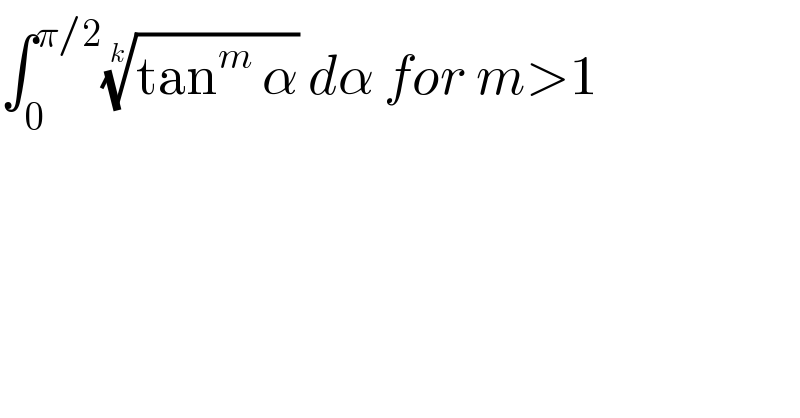Question Number 91735 by frc2crc last updated on 02/May/20

$$\int_{\mathrm{0}} ^{\pi/\mathrm{2}} \sqrt[{{k}}]{\mathrm{tan}^{{m}} \:\alpha}\:{d}\alpha\:{for}\:{m}>\mathrm{1} \\ $$
Commented by mathmax by abdo last updated on 03/May/20

$${I}\:=\int_{\mathrm{0}} ^{\frac{\pi}{\mathrm{2}}} \left({tan}^{{m}} \alpha\right)^{\frac{\mathrm{1}}{{k}}} \:{d}\alpha\:\:{chsngement}\:{tan}\alpha\:={x}\:{give} \\ $$$${I}\:=\int_{\mathrm{0}} ^{\infty} \left({x}^{{m}} \right)^{\frac{\mathrm{1}}{{k}}} \:\frac{{dx}}{\mathrm{1}+{x}^{\mathrm{2}} }\:=\int_{\mathrm{0}} ^{\infty} \:\:\frac{{x}^{\frac{{m}}{{k}}} }{\mathrm{1}+{x}^{\mathrm{2}} }{dx}\:\:{changement}\:\:{x}={u}^{\frac{\mathrm{1}}{\mathrm{2}}} \:{give} \\ $$$${I}\:=\int_{\mathrm{0}} ^{\infty} \:\:\frac{{u}^{\frac{{m}}{\mathrm{2}{k}}} }{\mathrm{1}+{u}}\:\frac{\mathrm{1}}{\mathrm{2}}{u}^{\frac{\mathrm{1}}{\mathrm{2}}−\mathrm{1}} \:{du}\:=\frac{\mathrm{1}}{\mathrm{2}}\int_{\mathrm{0}} ^{\infty} \:\:\frac{{u}^{\frac{{m}}{\mathrm{2}{k}}+\frac{\mathrm{1}}{\mathrm{2}}−\mathrm{1}} }{\mathrm{1}+{u}}\:{du} \\ $$$${we}\:{have}\:{proved}\:{that}\:\int_{\mathrm{0}} ^{\infty} \:\:\frac{{t}^{{a}−\mathrm{1}} }{\mathrm{1}+{t}}{dt}\:=\frac{\pi}{{sin}\left(\pi{a}\right)}\:{if}\:{o}<{a}<\mathrm{1}\:\Rightarrow\: \\ $$$${I}\:=\frac{\mathrm{1}}{\mathrm{2}}×\frac{\pi}{{sin}\left(\pi\left(\frac{{m}}{\mathrm{2}{k}}+\frac{\mathrm{1}}{\mathrm{2}}\right)\right)}\:=\frac{\pi}{\mathrm{2}{sin}\left(\frac{{m}\pi}{\mathrm{2}{k}}+\frac{\pi}{\mathrm{2}}\right)}\:\Rightarrow \\ $$$${I}\:=\frac{\pi}{\mathrm{2}{cos}\left(\frac{{m}\pi}{\mathrm{2}{k}}\right)} \\ $$$$\frac{{m}}{\mathrm{2}{k}}+\frac{\mathrm{1}}{\mathrm{2}}−\mathrm{1}\:=\frac{{m}}{\mathrm{2}{k}}−\frac{\mathrm{1}}{\mathrm{2}}\:=\frac{\mathrm{1}}{\mathrm{2}}\left(\frac{{m}}{{k}}−\mathrm{1}\right)<\mathrm{0}\:\Rightarrow{m}<{k}\:\:{so}\:{the}\:{condition}\:{is} \\ $$$$\mathrm{1}<{m}<{k} \\ $$
